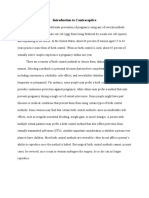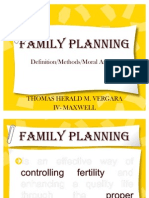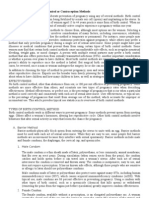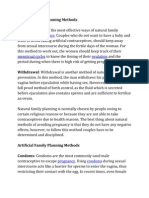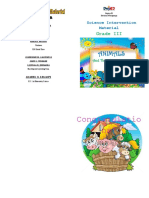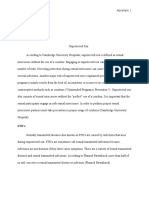Family Planning: Birth Control Methods
Family Planning: Birth Control Methods
Uploaded by
resolution8878Copyright:
Available Formats
Family Planning: Birth Control Methods
Family Planning: Birth Control Methods
Uploaded by
resolution8878Original Description:
Original Title
Copyright
Available Formats
Share this document
Did you find this document useful?
Is this content inappropriate?
Copyright:
Available Formats
Family Planning: Birth Control Methods
Family Planning: Birth Control Methods
Uploaded by
resolution8878Copyright:
Available Formats
Family planning
Combined oral contraceptives. Introduced in 1960, "the Pill" has played an instrumental role in family planning for decades.
Family planning is the planning of when to have children,and the use of birth control and other
techniques to implement such plans. Other techniques commonly used include sexuality
education, prevention and management of sexually transmitted infections,[3] pre-conception
counseling and management, and infertility management.
Family planning is sometimes used as a synonym for the use of birth control, though it often includes
more. It is most usually applied to a female-male couple who wish to limit the number of children they
have and/or to control the timing of pregnancy (also known as spacing children).
Family planning services are defined as "educational, comprehensive medical or social activities which
enable individuals, including minors, to determine freely the number and spacing of their children and to
select the means by which this may be achieved."
Birth Control methods
FOR WOMEN
Birth control methods women can use without going to a clinic or doctor:
The Female Condom (Female Condom)
The female condom is a soft, loose-fitting thin plastic pouch that
goes inside a woman's vagina.
You plan ahead and put it in before sex and use a new condom
each time you have sex.
Condoms protect you from both pregnancy and STDs, including
HIV.
Female condoms are plastic so people who are allergic to latex can
use them.
You can get them at drug stores and most health clinics.
Fertility Awareness Method
You learn how to tell when you can get pregnant.
Avoid sex or use other birth control during this time.
Spermicides
Spermicides are chemicals that kill sperm. They come in foam, gel,
film or suppositories.
Spermicides used with a condom are very effective.
You can get them at drug stores and some health clinics.
Abstinence
Abstinence from all sex protects you and your partner from
pregnancy and STDs/HIV.
People can choose abstinence at any time and at any age.
Hormone methods give constant protection from pregnancy. See a clinic or doctor for
these methods:
Birth Control Pills
You take one pill at the same time every day. Missing a pill
increases your chance of pregnancy.
Pills are easy to take and are effective birth control that doesn't
interrupt sex.
The "Shot" (Depo Provera)
You get a birth control shot once every 3 months from a doctor or
nurse.
The shot is an easy method and almost 100 percent effective if you
get your shot ON TIME.
Birth Control Patch (Ortho Evra)
The patch is a thin, stick-on square that is placed on your body to
prevent the release of an egg.
A new patch is used once a week for three weeks and the fourth
week is patch-free.
The patch is almost 100 percent effective when used the right way.
Vaginal Ring (NuvaRing)
This small, soft plastic ring has hormones to prevent pregnancy.
You place a new ring in your vagina every month.
The ring is easy to use and is almost 100 percent effective.
Implant (Implanon)
The implant is a thin, 2-inch plastic rod that uses hormones to
prevent pregnancy for 3 years.
A clinic doctor or nurse inserts it under the skin on the inside of
your arm.
The implant is VERY effective.
Other birth control methods might be right for you. Talk to your clinic nurse or doctor
about:
IUD(ParaGard)/IUS(Mirena)
These small devices are inserted into your uterus.
They work for 5-10 years.
They are VERY effective.
Diaphragm
This is a rubber cap that needs to be fitted to your size by a clinic
doctor or nurse.
It must be inserted into your vagina EACH time you have sex.
Are you ready to think about permanent birth control?
Sterilization
If you don't want children or don't want any more children, getting
your "tubes tied" (tubal ligation) or blocked are safe, effective
procedures.
Emergency Contraception (Plan B)
Emergency birth control pills or EC may be taken AFTER
unprotected sex to prevent pregnancy.
EC reduces the risk of pregnancy when taken as soon as possible
or within 5 days of sex.
EC is NOT the same as the abortion pill and will NOT stop or harm
the pregnancy or fetus if you are already pregnant.
Keep EC on hand as a back-up in case a condom breaks or another
birth control method fails.
You can get EC from the drugstore without a prescription if you are
18 or older (with one if you are under 18) or for low or no-cost at
a family planning clinic.
FOR MEN
Birth control is not just for women!
MEN... YOU can . . .
Decide if or when you want a child by using birth control.
Protect yourself and your partner from HIV or other sexually transmitted diseases (STDs),
like gonorrhea, chlamydia, or hepatitis.
Gain peace of mind and have better sex knowing you are protecting yourself and your
partner from the risks of unprotected sex.
No birth control method works 100 percent of the time. So unless you want to be a father,
you should use your own method, don't just rely on your female partner's method.
Condoms (for men)
Condoms protect you from both pregnancy AND STDs, including
HIV.
Condoms give you the BEST protection when you use them in the
right way EVERY time.
Condoms are made of latex or thin plastic (polyurethane). Use
plastic condoms if you have a latex allergy. Both are effective.
Keep condoms safe from heat, direct sunlight and oil-based
lubricants as these may cause the condom to break.
You can get condoms at drugstores and some health clinics.
Withdrawal or "Pulling Out"
You are in control...
Withdrawal works when you pull your penis out and away from
your partner's vagina BEFORE you ejaculate (cum).
Withdrawal prevents sperm from entering a woman's body and
reaching an egg.
Withdrawal does not protect you from STDs or HIV.
It may be hard to pull out. How well it works depends on being
able to know when you will cum.
Abstinence from all sex protects you and your partner from
pregnancy and STDs/HIV.
People can choose abstinence at any time and at any age.
Emergency Contraception (Plan B )
Emergency birth control pills or EC may be taken by your female
partner AFTER unprotected sex to prevent pregnancy.
EC reduces the risk of pregnancy when taken as soon as possible
or within 5 days of sex.
EC is NOT the same as the abortion pill and will NOT stop or harm
the pregnancy or fetus if your partner is already pregnant.
Keep EC on hand as a back-up in case a condom breaks or you
don't pull out in time.
You can get EC for your female partner from the drugstore without
a prescription if you are 18 or older (with one if you are under 18)
or for low or no-cost at a family planning clinic.
You might also like
- CHAPTER 8 - Latex DippingDocument79 pagesCHAPTER 8 - Latex DippingZaimr100% (4)
- SOLIDMensuration Finals TopicsDocument25 pagesSOLIDMensuration Finals Topicsresolution8878100% (3)
- A Sex Worker Handbook, XXX GuideDocument47 pagesA Sex Worker Handbook, XXX GuideAB-75% (4)
- Birth Control Methods Fact Sheet - WomenshealthDocument17 pagesBirth Control Methods Fact Sheet - WomenshealthsristakNo ratings yet
- Long-Acting Reversible Contraceptives or "LARC" Methods (Intrauterine Devices, HormonalDocument4 pagesLong-Acting Reversible Contraceptives or "LARC" Methods (Intrauterine Devices, HormonalAngelica TumangNo ratings yet
- T.P.U.W - Contraceptives Lecture (A4HI)Document35 pagesT.P.U.W - Contraceptives Lecture (A4HI)Osasere AiwansobaNo ratings yet
- Family Planning: Artificial MethodDocument22 pagesFamily Planning: Artificial MethodSkyllen FhayeNo ratings yet
- Teen Talk Vol 3Document2 pagesTeen Talk Vol 3api-309082881No ratings yet
- Birth Control PillsDocument20 pagesBirth Control PillsAnonymous Hie4fXNo ratings yet
- Contraception: Amanda White Madelaine YatesDocument29 pagesContraception: Amanda White Madelaine YatesAmandaWonnacottNo ratings yet
- Essay One Final Exam Fhs 2450Document2 pagesEssay One Final Exam Fhs 2450api-240344874No ratings yet
- ContraceptionDocument19 pagesContraception26sadNo ratings yet
- CONTRACEPTION LectureDocument49 pagesCONTRACEPTION LectureAnton OcampoNo ratings yet
- Family Planning SpeechDocument2 pagesFamily Planning SpeechLietOts KinseNo ratings yet
- Health Assignment On Contraception66.Document41 pagesHealth Assignment On Contraception66.Fiona1991No ratings yet
- CONTRACEPTIONSDocument65 pagesCONTRACEPTIONSCharmaine FernandezNo ratings yet
- NCP HypocalcemiaDocument4 pagesNCP Hypocalcemiabkensie09No ratings yet
- Biology Task ReproductionDocument21 pagesBiology Task Reproductionapi-358348609No ratings yet
- Contraception 2Document6 pagesContraception 2api-457902426No ratings yet
- Conception and ContraceptionDocument10 pagesConception and ContraceptionmukairirwabrieyNo ratings yet
- Introduction To ContraceptiveDocument12 pagesIntroduction To ContraceptiveLisa Nelson-FriginetteNo ratings yet
- Birth ControlDocument9 pagesBirth ControlchalsieNo ratings yet
- Family PlanningDocument3 pagesFamily PlanningCarmella FloresNo ratings yet
- Biology AssignmentDocument32 pagesBiology AssignmentZul HanifNo ratings yet
- Mapeh IV - Family PlanningDocument69 pagesMapeh IV - Family PlanningheraldvNo ratings yet
- CONTRACEPTIVESDocument4 pagesCONTRACEPTIVESangmariianoNo ratings yet
- What Are The Types of Birth Control?Document7 pagesWhat Are The Types of Birth Control?Remy Castelo Santos CortezNo ratings yet
- Different Ways To Prevent PregnancyDocument6 pagesDifferent Ways To Prevent PregnancyJason BorresNo ratings yet
- Family PlanningDocument5 pagesFamily PlanningjuandelajoseNo ratings yet
- Family Planning ConciseDocument117 pagesFamily Planning Concisegracebally06No ratings yet
- The Different Types ofDocument5 pagesThe Different Types ofJuanillo AllyssaNo ratings yet
- Contraceptives: Submitted byDocument21 pagesContraceptives: Submitted byFranine AlyssaNo ratings yet
- Contraception InformationDocument10 pagesContraception InformationDivineNo ratings yet
- Anti-Teenage PregnancyDocument4 pagesAnti-Teenage PregnancyAdilen EsparagozaNo ratings yet
- Family Planning MethodsDocument28 pagesFamily Planning MethodsArtemio TupanNo ratings yet
- Contraceptive Methods Adesh KumarDocument38 pagesContraceptive Methods Adesh KumarAlok kumar RajanNo ratings yet
- 10 Forms of ContraceptionDocument2 pages10 Forms of ContraceptionNatalie PembertonNo ratings yet
- Sexual Self Thales ReportDocument22 pagesSexual Self Thales ReportToni GonzalesNo ratings yet
- ContraceptionDocument25 pagesContraceptionNatinael HaileNo ratings yet
- BIRTcontrol LecDocument3 pagesBIRTcontrol LecYUAN CAÑASNo ratings yet
- 6.contraceptive and Family Planning Group One AssigmentDocument36 pages6.contraceptive and Family Planning Group One AssigmentBekeNo ratings yet
- Group 5 Modern Family PlanningDocument29 pagesGroup 5 Modern Family PlanningIvy Lurraine LagramadaNo ratings yet
- Contraceptive MethodsDocument30 pagesContraceptive MethodsLoice Buza100% (1)
- Type of Family Planning Natural Family PlanningDocument4 pagesType of Family Planning Natural Family Planningboyet101No ratings yet
- Barrier Methods of Birth Control: Treatment OverviewDocument12 pagesBarrier Methods of Birth Control: Treatment OverviewAlfred MontealtoNo ratings yet
- Contraception MethodsDocument22 pagesContraception MethodspghsNo ratings yet
- Family PlanningDocument3 pagesFamily PlanningSunghoonOnlyNo ratings yet
- DEBATEDocument2 pagesDEBATEKia LeighNo ratings yet
- Natural Family Planning MethodsDocument9 pagesNatural Family Planning MethodsJeff LibaoNo ratings yet
- Birth ControlDocument14 pagesBirth ControlDonald Vaughn SutherlandNo ratings yet
- Contraception Methods: 1. Long-Acting Reversible ContraceptionDocument5 pagesContraception Methods: 1. Long-Acting Reversible ContraceptionJemiline OlbocNo ratings yet
- Planning Methods (Contraceptives, Pills, Condoms)Document7 pagesPlanning Methods (Contraceptives, Pills, Condoms)peachyskizNo ratings yet
- Family PlanningDocument6 pagesFamily PlanningDhanica Yvonne ReymonteNo ratings yet
- SSPDocument4 pagesSSPHanna FloresNo ratings yet
- Family Planning (1) 1001121Document7 pagesFamily Planning (1) 1001121Jose Mariano MelendezNo ratings yet
- Family PlanDocument12 pagesFamily PlanFobie Kate CarinoNo ratings yet
- Video Resume Assignment "Method Family Palnning": Nama: Mei Rista Eka Wardani NIM: 1150019028 B.inggris KeperawatanDocument6 pagesVideo Resume Assignment "Method Family Palnning": Nama: Mei Rista Eka Wardani NIM: 1150019028 B.inggris KeperawatanMei Rista EkaNo ratings yet
- Biology: Appreciating The Contribution of Science and Technology To Human ReproductionDocument15 pagesBiology: Appreciating The Contribution of Science and Technology To Human ReproductionNadhirah Mohd HasanNo ratings yet
- CONTRACEPTIONDocument8 pagesCONTRACEPTIONeileenNo ratings yet
- Family PlanningDocument19 pagesFamily Planninglabu matahNo ratings yet
- Contraception Methods: 1. Long-Acting Reversible ContraceptionDocument5 pagesContraception Methods: 1. Long-Acting Reversible ContraceptionFaith MarfilNo ratings yet
- Division Memo No. 168 S. 2016 ; Reiteration of DepEd Order No. 8 S. 2007 on the Revised Implementing Guidelines on the Operation and Management of School Canteens in Public Elementary and Secondary Schools — DeDocument32 pagesDivision Memo No. 168 S. 2016 ; Reiteration of DepEd Order No. 8 S. 2007 on the Revised Implementing Guidelines on the Operation and Management of School Canteens in Public Elementary and Secondary Schools — Deresolution8878100% (1)
- Sourcing and ProcurementDocument50 pagesSourcing and Procurementresolution8878No ratings yet
- The Sound Absorption of Occupied Auditorium Seating by J.S.Bradley 1996Document6 pagesThe Sound Absorption of Occupied Auditorium Seating by J.S.Bradley 1996resolution8878No ratings yet
- Inventory Management (Grp. 1 Me-503)Document48 pagesInventory Management (Grp. 1 Me-503)resolution8878No ratings yet
- Distribution Requirement PlanningDocument17 pagesDistribution Requirement Planningresolution8878No ratings yet
- SIM Animals & Their Basic NeedsDocument10 pagesSIM Animals & Their Basic Needsresolution8878No ratings yet
- w040001 PDFDocument31 pagesw040001 PDFresolution8878No ratings yet
- Chapter 1Document27 pagesChapter 1resolution8878No ratings yet
- Cell Cycle: Mitosis Is A Process of Cell Division Which Results in The Production of Two DaughterDocument2 pagesCell Cycle: Mitosis Is A Process of Cell Division Which Results in The Production of Two Daughterresolution8878No ratings yet
- ch01 FOROUZAN DATA COMMUNICATIONDocument18 pagesch01 FOROUZAN DATA COMMUNICATIONresolution8878No ratings yet
- Basic BJT Amplifier ConfigurationsDocument9 pagesBasic BJT Amplifier Configurationsresolution8878No ratings yet
- Internet: by Maria Elena Y. TimbangDocument56 pagesInternet: by Maria Elena Y. Timbangresolution8878No ratings yet
- Chapter 2 Introduction To ProgrammingDocument36 pagesChapter 2 Introduction To Programmingresolution8878No ratings yet
- ADXL3 XXDocument7 pagesADXL3 XXresolution8878No ratings yet
- 657746unit 3 Dynamics in Music InformationDocument3 pages657746unit 3 Dynamics in Music Informationresolution8878No ratings yet
- Module in Free FallDocument3 pagesModule in Free Fallresolution8878No ratings yet
- The Other RGB Color ChartDocument5 pagesThe Other RGB Color Chartresolution8878No ratings yet
- ASUS Sabertooth X79 LGA 2011: ModelDocument5 pagesASUS Sabertooth X79 LGA 2011: Modelresolution8878No ratings yet
- Bishop 2014Document24 pagesBishop 2014Matheus SvóbodaNo ratings yet
- Module 1 FinalDocument1 pageModule 1 Finallaurence benjie oliverioNo ratings yet
- North South University: MKT 202, Section-01Document20 pagesNorth South University: MKT 202, Section-01Ibrahim PashaNo ratings yet
- HBSC, 2006 Mandatory QuestionnaireDocument37 pagesHBSC, 2006 Mandatory Questionnaireso stNo ratings yet
- Notes For HivDocument11 pagesNotes For HivEbenezar Paul Ratnaraj SNo ratings yet
- Hivaids Sexually Transmitted Infections and Sexual Exploitation Among Commercial Sex Workers in Western Oromia EthiopiaDocument11 pagesHivaids Sexually Transmitted Infections and Sexual Exploitation Among Commercial Sex Workers in Western Oromia EthiopiaTaju AliNo ratings yet
- Young Talk, June 2008Document4 pagesYoung Talk, June 2008Straight Talk FoundationNo ratings yet
- Cum Sa Sugi Pula 2Document28 pagesCum Sa Sugi Pula 2Black Jok3rNo ratings yet
- Ojsadmin, 406Document5 pagesOjsadmin, 406Frans LandiNo ratings yet
- Emerald Academy: Bhadrapur-8, Jhapa Nepal Project Work of Computer Science On ""Document34 pagesEmerald Academy: Bhadrapur-8, Jhapa Nepal Project Work of Computer Science On ""Ayush SigdelNo ratings yet
- Chapter 6 - Nursing Care For The Family in Need of Reproductive Life PlanningDocument7 pagesChapter 6 - Nursing Care For The Family in Need of Reproductive Life PlanningBern NerquitNo ratings yet
- Safe Sex.: No RegretsDocument17 pagesSafe Sex.: No RegretsThat Cat in the Hat.100% (1)
- General Questions About Sex: Frequently Asked Questions (Faqs)Document4 pagesGeneral Questions About Sex: Frequently Asked Questions (Faqs)Nitin DewanganNo ratings yet
- Knowledge Perceptions Attitudes and Practices of Hiv Aids a Comparative Study of Behavior Change in Commercial Sex Workers and Truck Drivers in the Dindigul and Coimbatore Districts of Tamil Nadu.originalDocument53 pagesKnowledge Perceptions Attitudes and Practices of Hiv Aids a Comparative Study of Behavior Change in Commercial Sex Workers and Truck Drivers in the Dindigul and Coimbatore Districts of Tamil Nadu.originalMatin Ahmad KhanNo ratings yet
- Social Security Law AssignmentDocument8 pagesSocial Security Law AssignmentOntebogile MarokuNo ratings yet
- Powder TestDocument16 pagesPowder TestFoo He XuanNo ratings yet
- ICFP Youth Advocacy Briefing NoteDocument13 pagesICFP Youth Advocacy Briefing NoteKristen NallanNo ratings yet
- DI333 541 561 EngDocument21 pagesDI333 541 561 EngKrishna Mohan.p.rNo ratings yet
- Post - Magazine March 15, 2012Document8 pagesPost - Magazine March 15, 2012The Brown Daily HeraldNo ratings yet
- Older Adults and Sexual Health: A Guide For Aging Services ProvidersDocument28 pagesOlder Adults and Sexual Health: A Guide For Aging Services Providersanova tigaNo ratings yet
- Family Planning and Contrceptives For Midwifery StudentsDocument190 pagesFamily Planning and Contrceptives For Midwifery StudentsAbdusamed100% (1)
- ZXZXZXZXZDocument92 pagesZXZXZXZXZkiranpschaithanyaNo ratings yet
- Thesis Statement On Birth ControlDocument6 pagesThesis Statement On Birth Controlnikkismithmilwaukee100% (2)
- Chapter 5Document96 pagesChapter 5goppubcaNo ratings yet
- Unprotected SexDocument10 pagesUnprotected Sexapi-308820858No ratings yet
- ISO 4074:2014 Standard Update: Date: 03 Nov 2014Document10 pagesISO 4074:2014 Standard Update: Date: 03 Nov 2014HanifNo ratings yet




















